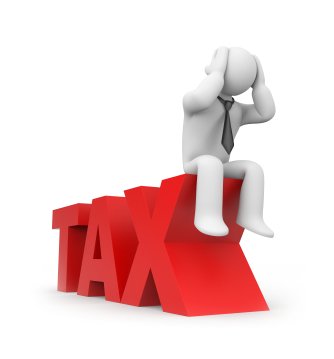Corporate Tax Expense
by Too Shy To Say

Tax gives me a headache
The Question(s):
Perhaps a silly question - but how do I enter the corporate tax expense?
Is it a business expense at all?
Which two accounts do I use to make the entry?
My Answer:Do you know how many silly questions I've asked in my life? ... Well I just stopped counting ... sometimes my questions are smart ... and sometimes my questions are just plain stupid because my brain gets stuck ... it's like a huge boulder blocking my path ... do I climb over, go around it ... not usually :0)
But does it stop me asking ... no uh uh!
I will keep this answer simple and give you
the basic tax bookkeeping entry ... ignoring deferred taxes and the refund of dividends on hand.
Debit (increase) Income Tax Expense (an expense account on your income statement)
Credit (increase) Income Tax Payable (a current liability account on your balance sheet)
Thanks for the question ... and hope my answer helps you out. ;-)
Corporate Income Tax Refund Journal Entry
(Canada)
Hello,
What is the bookkeeping entry to record the corporate income tax refund from prior tax years?

Hi,
I will assume that a bookkeeping entry was made each year ... once you had calculated the
tax refund due as follows:
Dr. (decrease) Corporate Income Tax Payable (a current liability on your balance sheet)
Cr. (decrease) Income Tax Expense (an expense account on your income statement)
Any corporate income tax installments made do not affect your income statement. Installments are NOT income tax expenses ... so I will also assume that when your
corporate income tax installments were made, bookkeeping entries for each year were made as follows:
Dr. (decrease) Corporate Income Tax Payable (current liability on your balance sheet)
Cr. (decrease) Cash in Bank (current asset on your balance sheet).
I am also assuming that if the Corporate Income Tax Payable account was a debit balance, at the appropriate year-end, the amount would have been reclassified by your accountant to Corporate Income Tax Refundable, a current asset account, as part of your year-end adjusting entries ... and reversed on January 1.
Once you receive your
income tax refund, you would book the following entry to clear your payable account:
Dr. (increase) Cash in Bank ( a current asset on your balance sheet)
Cr. (increase) Corporate Income Tax Payable (current liability on your balance sheet)
Cr. (increase) Interest Income (income account on your income statement)
If you have any working papers, you will probably have an analysis of your corporate income tax payable by year. It is in your working paper file that you will allocate the refund to the appropriate years.
That said, I like to book the actual refund entry by year with good comments so that it is clear to anyone reviewing the general ledger what is happening in the account.
For all the bookkeeping entries, I like to make good memo notes about which year the entry pertains to.

